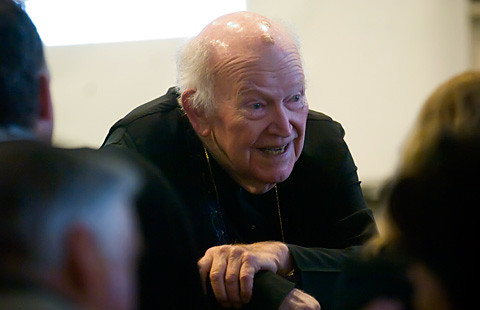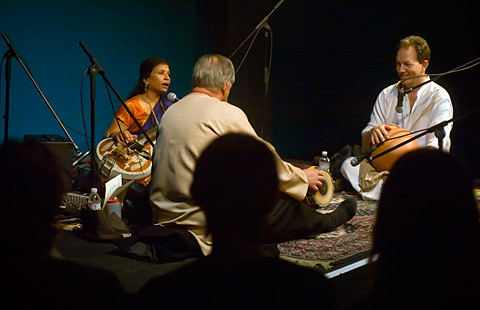Although Bill Skelton, Robert Ho Professor in Asian studies and professor of music emeritus, retired from Colgate 15 years ago, he still receives letters from alumni saying that participating in the India Study Group with him was a life-changing experience.
Skelton came to Colgate in 1954 as a music professor with degrees in music from the University of Illinois and Yale. Skelton had studied and played with some of the greats, including German composer Paul Hindemith and conductor Leonard Bernstein.
 |
| Bill Skelton, Robert Ho Professor in Asian studies and professor of music emeritus, talks at a special event held for him at the Ho Reading Room in October. (Photo by Luke Connolly ’09) |
As a bassoonist, he paid his way through Yale by playing in the New Haven Symphony, the Hartford Symphony, and Broadway shows.
At Colgate, Skelton founded the Colgate Concert Orchestra and the Chapel Choir, as well as conducted the marching band, glee club, and orchestra. He also taught a Core program on India for so long that he became deeply involved in India.
Skelton described his path to learning about Indian music and culture as a “jigsaw puzzle.” Three pieces of the puzzle were the influences of the sitar master Ravi Shankar, ethnomusicologist Charles Seeger (father of Pete Seeger), and Ken Morgan, founder of Colgate’s Chapel House.
In 1963 he took his first trip to India on a Ford Grant, which was the start of his work with Indian musicians. Skelton learned to play the nagaswaram, a classical Indian wind instrument, through which he earned much respect as a Westerner performing at weddings and temple rituals.
“It was my passport. I went into temples that are still barred to non-Hindus,” he said. The connections he made through his music continued to serve him later when traveling with Colgate students throughout India.
Skelton led the first study group informally in 1969 and developed it over the years. He retired from teaching in 1993, but continued leading the study groups until 2005.
With help from his late wife, Mary Louise, a team of professors from the University of Madras, philosophers, musicians, and a well-known Indian dancer, Skelton designed unique programs that varied every year.
Groups studied folk dance, theater, music, and philosophy. They spent a month with the Maharaja of Myesore, rode a train that tracked Lord Rama’s path from Ayodhya to Sri Lanka, and performed street theater in front of 2,000 people who traveled from surrounding villages to “see those crazy Americans.”
By fully immersing students in the culture and pushing them to perform tasks that seemed impossible, Skelton saw his students overcome their perceived limitations.
“In one day, I did thirty things I’d never done before, and your life changes before you because this gentleman has faith in you,” said Bob Musiker ’80.
Musiker was among those who gathered at Colgate in late October to honor Skelton with reminiscences from the study group as well as a night of South Indian devotional music.
John Carter, Robert Ho Professor in Asian studies and professor of philosophy and religion, helped organize the event in honor of his long-time colleague.
“It seemed like a wonderful idea to take a break, look at all that he’s done, and celebrate him,” Carter said.
 |
| Three musician friends of Bill Skelton’s perform South Indian devotional music at the Palace Theater. (Photo by Luke Connolly ’09) |